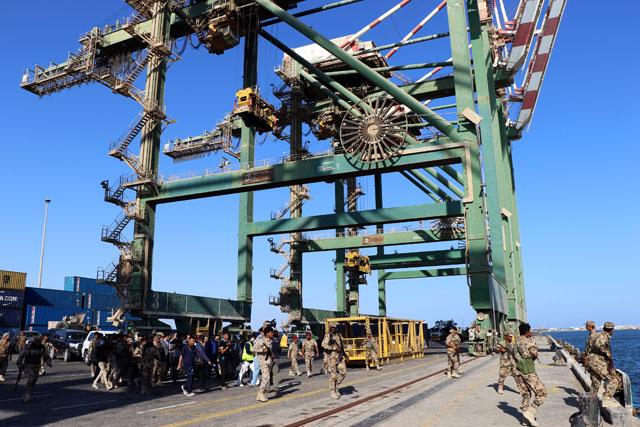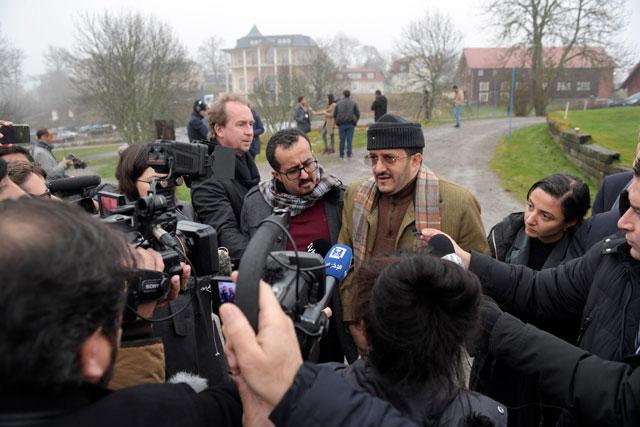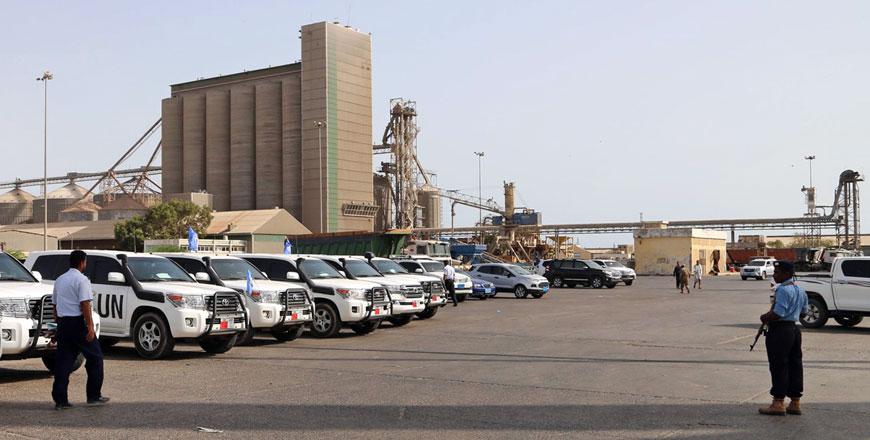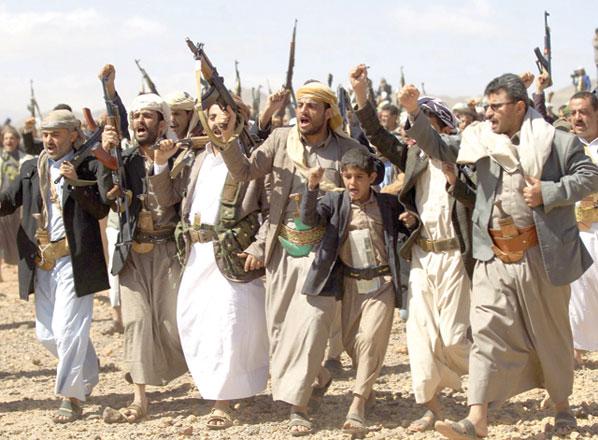You are here
Yemen warring parties agree to reopen Sanaa airport, still in talks on port
By Reuters - Dec 12,2018 - Last updated at Dec 12,2018

Soldiers escort government officials touring the container terminal at Aden port, Yemen, on Wednesday (Reuters photo)
RIMBO — Yemen's warring parties agreed on Wednesday to reopen Sanaa airport in the Houthi-held capital, sources said, as Western nations press the two sides to agree on confidence-building measures before the end of the first UN-led peace talks in two years.
The Iranian-aligned Houthi movement and the Saudi-backed government of Abed Rabbo Mansour Hadi were still discussing a United Nations proposal on the contested port city of Hodeidah, a lifeline for millions of Yemenis facing starvation.
UN Secretary General Antonio Guterres is due to attend final talks in Sweden on Thursday to support his envoy's efforts to launch a political process to end the nearly four-year-old war. Another round of talks could be held in early 2019.
The Houthis hold most population centres, including Hodeida and the capital Sanaa from which it ousted Hadi's government in 2014. The government is now based in the southern port of Aden.
The two parties agreed that international flights would stop at a government-held airport for inspections before flying in or out of Sanaa, two sources familiar with the talks said.
They have yet to agree on whether those inspections would be in Aden airport or that of Sayun, the sources added.
The Saudi-led military coalition that intervened in the war in 2015 to restore Hadi’s government controls the air space.
The coalition has faced increased scrutiny from Western allies, some of which supply it with arms and intelligence, over the war that has killed tens of thousands of people.
Ambassadors from countries that are permanent members of the Security Council — China, France, Russia, the United Kingdom and the United States - have joined talks with delegation heads.
US President Donald Trump told Reuters on Tuesday he could abide by legislation being considered by the Senate to end US support for the war following outrage over the murder of Saudi journalist Jamal Khashoggi in the kingdom’s Istanbul consulate.
“I hate to see what’s going on in Yemen,” Trump said. “But it takes two to tango. I’d want to see Iran pull out of Yemen too. Because — and I think they will.”
The nearly four-year-old conflict is largely seen in the Middle East as a proxy war between Saudi Arabia and its rival, Shiite Muslim Iran, which has welcomed the peace efforts.
Hodeida tricky
UN envoy Martin Griffiths, trying to avert a full-scale assault on Hodeida, where coalition forces have massed on the outskirts, is asking both sides to withdraw from the city.
His proposal envisions an interim entity being formed to run the city and port and international monitors being deployed.
Asked if the government could accept that proposal, culture minister Marwan Dammaj said: “We are still discussing it.”
Both sides have agreed to a UN role in the port, the entry point for most of Yemen’s commercial imports and vital aid, but differ on who should run the city. The Houthis want Hodeida declared a neutral zone, while Hadi’s government believes the city should fall under its control as a matter of sovereignty.
“The devil is in the details — withdraw how far [from Hodeidah], the sequence, who governs and delivers services,” said one diplomat, speaking on condition of anonymity.
They have also yet to agree on shoring up the central bank, and on a transitional governing body, although a deal was struck on a prisoner swap that could see 15,000 prisoners released.
A small group of Yemenis demonstrated outside the venue in Rimbo, north of Stockholm, waving flags of the former South Yemen in support of a separatist movement fighting alongside the coalition while trying to undermine Hadi’s government in the south.
“We are here to tell the UN envoy — that a solution in Yemen will have to include a solution regarding the South,” said Naif Al Kaladi, a Swedish resident.
The separatists want to revive South Yemen, which was unified with North Yemen in 1990 under late former president Ali Abdullah Saleh, who was accused of marginalising the south economically and politically.
Related Articles
RIMBO, Sweden — Yemen’s main port city should be declared a “neutral zone” and the United Nations could play a role in Sanaa airport, the Ir
DUBAI — Houthi fighters and Saudi-backed pro-government forces battled in Yemen's port city of Hodeida on Wednesday, breaching a ceasefire a
DUBAI — Iranian-aligned Houthi forces have agreed to draw back from two Yemeni ports on Monday while withdrawal from the main Hodeidah port


















